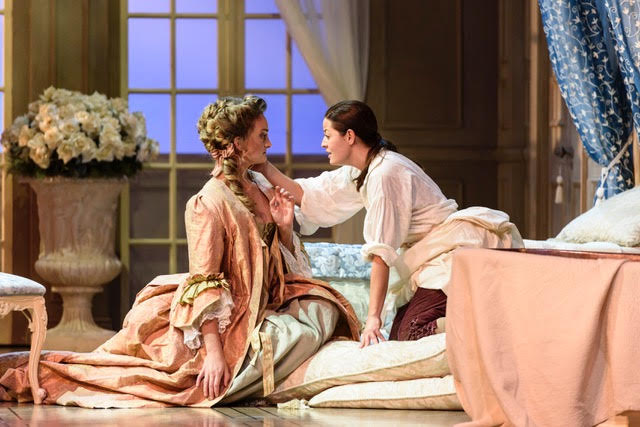Scottish Opera have opened their new season with a revival of Tom Allen’s production of The Marriage Of Figaro, originally seen in 2010. It is a very conventional production, but with beautiful sets and lovely colours and frankly, after some of the “updated” productions seen in London recently, one can be grateful that this traditional approach, allows the beauty of Mozart’s music and the humour of the plot to emerge unscathed by attempts to make it “relevant” to today. Of course, the original opera was very radical in its time, dealing with the issues of class status and power, and of the treatment of women. Indeed, the play that the opera was based on was banned in a number of countries at the time.
Having been at Scottish Opera’s touring production of The Elixir Of Love last night (reviewed here), it is great to be in the modernised Theatre Royal (great new staircase!) and to have the full Scottish Opera orchestra performing superbly, led ably by Tobias Ringborg. They are totally in harmony with a very good cast, in particular the fine young Irish soprano, Anna Devin, who played Susanna and acted and sung superbly. She is complimented well by her Figaro, Ben McAteer, who is not only a very good singer but a fine comic actor.
Count Almaviva is ably sung and acted by Samuel Dale Johnson, a young Australian baritone who is making a name for himself at Covent Garden. His Countess is sung by young Scot Eleanor Dennis. At times, she is a little thin vocally but has a sweet tone. The page Cherubino is sung well by Hanna Hipp, although at times she can be a little over the top in her acting. Not even Mozart would think that Cherubino should be quite as randy as this production suggests!
Two of the minor roles are very well sung by Scottish Opera veterans. Marie McLaughlin has been singing Marcellina for over 30 years and is still in top form. Hopefully, she survived her flying trip onto stage when she was taking her bow at the end! Donald Maxwell, another Scottish Opera veteran, is good value as Antonio, the gardener. Other smaller parts are equally well sung and the stage business is well organised and keeps the audience’s interest throughout.
The audience response at this Sunday matinee is enthusiastic and it could be judged a better Figaro than the recent one in Covent Garden. Scottish Opera of course cannot afford the international stars that the Royal Opera House can, but the young singers that Scottish Opera use perform as well as the stars. More importantly, the orchestra and the production are perfectly in harmony, something that doesn’t always happen at Covent Garden.
This is one of the finest Figaros this reviewer has seen in over fifty years of opera going.
